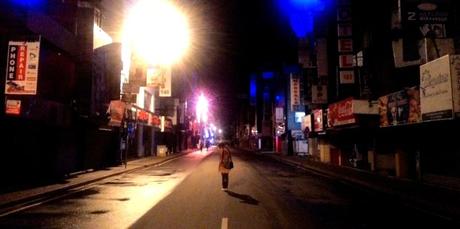[Note: the title is 5 bus routes. And the image is Aisha on Main Street during a photo-wandering one night.]

When I first started taking the bus, I wondered why my mother – in her modest teacher’s saree – kept her pota wrapped around her and excessively alert. Why she asked me, in my innocent school uniform, to be careful.
Fast-forward a few years to me taking the bus home after my first day at work. Sitting on the 187 as it ambled down that first stretch of Olcott Mawatha. Dude comes and sits next to me. I happen to glance at his phone as I reach over to the pay the conductor and spot what’s no doubt porn on this grainy screen. Few minutes later, I feel what’s like an elbow repeatedly jabbing into me. And it was. As the dude was having some fun with himself. Disgusted, I hugged my bag closer to my chest and turned to the window. Out of the corner of my eye, I see his hand reaching over toward my chest which was fortunately shielded by my bag. I kind of shifted and dude ran off.
If you’re surprised that this happens, that’s cute.
I’m surprised it took me this long to rant about this topic, considering it’s something I rant about on a daily basis, angrily Tweet about and rage with [because it happens to all of us] my friends about; street harassment in Colombo, and across Sri Lanka in general. But having to be on edge for entire commutes home daily, my anxiety peaking and my hairs on end, it isn’t fun. Being told ‘aney so what to do’ is even less fun.
Perverts on Public Transport
The bane of every woman commuting around on a daily basis. Be it staring at you from across the aisle with a sleazy look/staring down at your chest while sitting next to you look to rubbing their crotch on your shoulder when you’re sitting in an aisle seat. Or groping you as you pass them in a crowded bus.
There’s always a bevy of ‘What Was She Wearing’ queries. Firstly, that’s immaterial and second, there is no distinction anyway. Be it school uniform, saree, drab baggy clothes, well-fitting clothes, hijab, this can and has happened. And if you’re calling the woman into question here…really?
These aren’t isolated incidents that happen once in a blue moon. If you trawl through social media, you’ll see women lamenting incidents like this on a daily basis.
And then the second tier of questions, from both men and some women, revolve around ‘Why Didn’t You Fight Back?’ Well, it’s really nice that you think that it’s so easy. Imagine being trapped in the crowded vehicle/crowded street, surrounded by people who only have a 50% chance of sticking up for you if things go south, mounted on top of your existing anxieties that surge at the thought of confrontation. It’s not simple, it really isn’t, and if you respond to someone’s rant about harassment by belittling their reaction to crippling fear and violation, you’re a part of the problem. The victim-blaming, female-shaming problem.
Patriarchy
While we don’t ever do anything to address this, it is the root of the [all] problem[s]. This odd dynamic that exists in these situations where the man believes he has some power over the woman – a power dictated to him down the generations – where he is allowed to do as he wishes irrespective of her dignity and value as a person.
This monster is going to take paragraphs, pages, books to unpack. Long story short though, not only does patriarchy bring about the rampant harassment of women but the ‘justifications’ people offer for it. ‘Men no, can’t help’, ‘maybe what you were wearing aroused him’, ‘you should know better than…’- where we curtail women’s movement, behavior and choices because we believe that men just can’t help acting a certain way. [This rationale hurts men too – to be thought to have no control over your body’s reactions, that’s belittling and degrading.] This rationalisation for harassment, sexual assault, abuse is unnerving. We can’t ask the men to not do something wrong but we can ask the women to stop living their everyday lives. That phrase that gained traction after the 2012 Delhi rape case, ‘Don’t tell your daughter how to dress, tell your son not to rape’, rings ever true – that solution is treating a symptom when the virus that is the cause goes unchecked.
Shout out to the men who are so entrenched in this system that they can’t seem to care about someone else’ safety or, you know, just be a decent person. I once spent a mind-numbingly daft few minutes trying to get through to a guy who kept insisting that ‘it’s not really harassment if the guy didn’t intend to harass you, yes you felt harassed but was that his intention’ and how ‘this all comes down to women’s insecurities and anxieties, that is why you feel uncertain and violated and we shouldn’t put this on men’ oh and also ‘women in Sri Lanka have it better than men’.
I was boiling over with rage and chose to stop conversing for my own sanity’s sake. But seriously, imagine the feeling of trauma taking to the roads on a daily basis, going home exhausted from worry, only to hear people fault you for the threat that someone else has posed to you.
It took me traveling with a male friend, who was going home in the same direction, late one evening and for him to see the look of panic on my face or my ruler-straight spine when men got a little too close on the bus for him to see how much it gets to some females. To date, it still shocks men to hear what their female friends have been through – translate that shock into something good, please.
Patriotism
You’re probably wondering what this has to do with anything. And rightfully so. It’s because that the many times that women lament about their experiences of harassment, there is a bunch that comes out with ‘don’t say that, do you have evidence? Sri Lanka isn’t so bad okay’. Why not, yes – my experience and yes, it is. To have someone level allegations against the Sri Lankan Man equates to some insult to national integrity and their first reaction is to tell people to keep shut, not explore whether the Sri Lankan Man’s actions are deplorable and warranting of such allegations (they are).
In some cases, it’s because they just want to keep women silent. In more, it’s because people – men – are not ready or willing to accept the fact that this is a huge problem. That it draws back to generational, historical patriarchy and they’re so deeply entrenched in it that they can’t even see that they, collectively, nationally, are the problem.
Privilege
I’m not going to doubt the fact that a majority of women, in some circumstance or another, have experienced something along these lines. Nothing discounts the panic in that situation and nothing reduces the trauma it can leave. So-called ‘high society’ has as much tendency to harm you as does so-called ‘dodgy characters’. But we do have to realize that some segments of women do in fact have it better than others.
Some of us feel insecure traveling on public transport alone and when we’re too worried after a few incidents, some have more avenues out than others. If you’re well off financially, you have the option of taking tuks/cabs around every day and that’s good for you. Some of us have to bus wherever possible because we can’t afford a 500/= ride home daily. If you’re in the minority – and the catcallers/harassers identify this – you are demeaned further because they know you might not understand them. If you’re a hijabi, you might get harassed by your own, to shame you in some way, or others who are looking again to demean your identity. LGBTIQ women, women with disabilities, women who don’t fit into boxes – you can imagine that they are going to have it much worse. The discourse around women like this is as vile online as it is in real life.
Pepper Spray
Whenever I go off on this tirade after returning home sick of being on edge for the duration of my commute, someone volunteers the option of self-defense, usually a can of pepper spray. They mean well and I appreciate it – and should probably buy a can of the stuff – but it’s nevertheless disheartening that we have to devise ways to keep safe instead of eradicating the problem that’s causing that insecurity.
Where do we start?
I honestly have no idea.
Criminalise it? But then you have to rely on reporting. What if people don’t report due to access issues or because they’re doubtful if they’ll be taken seriously or not? Think about the fact that most policemen ogle women who pass by them, will women trust those who are supposed to protect them?
Education? That is seriously the most feasible option right now, where you end it before it can start, get to the kids before they’re too influenced by the roles forced on them, before they hear some of the ridiculous reasoning that people give for these incidents, without owning up to the fact that we have a problem.
A complete overhaul of social attitudes? Not feasible, but certainly ideal, because we have to start on a newer, equal slate.
Don’t ask me how we’ll get there.
Amalini De Syrah
The article was originally published on the author’s blog: https://amaliniii.wordpress.com
Featured image by: https://www.flickr.com/photos/poorfish/

